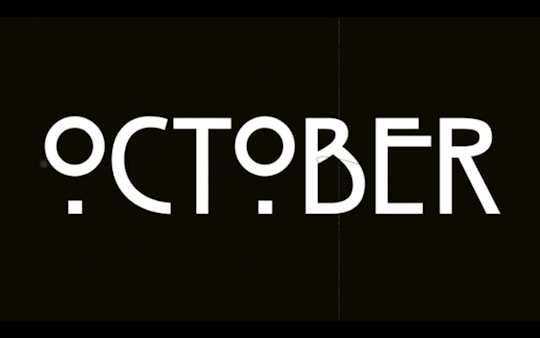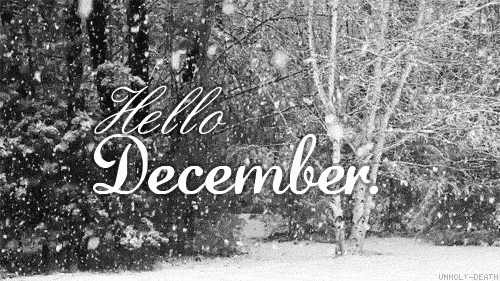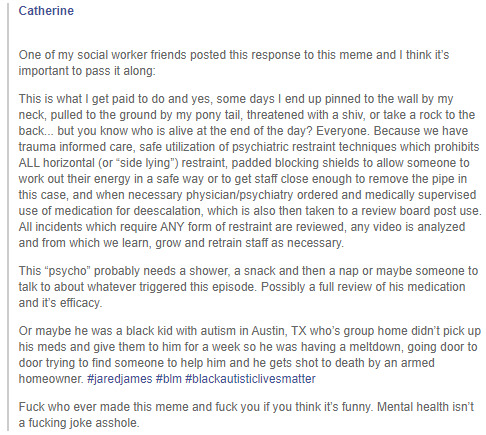Text
So, there's a lot of USians around who are very clearly fucking fed up with their political choices this election cycle, and planning to sit it out.
And I get it! What's the point of voting if there's no one to vote for?
The thing is, I'm Australian. In Australia, voting is compulsory. We don't get to sit out our elections, and I'll be real honest with you - we don't exactly get better choices than you lot. So how do you vote if there's no one to vote for? You find someone to vote against. And there's always someone to vote against.
Now, we have the pleasure of preferential voting in Australia - We get to rank every candidate from 1 to X, and I'll tell you, there's something so cathartic about putting the biggest bastard of the lot at the very bottom of your preferences. I understand that USians don't get that option - you get to mark one person, and that's it.
That means that you get one shot, so aim it at the biggest bastard of the lot. The candidate you most utterly detest. Put your vote in the worst possible place for them. Don't even think about who that vote's going towards, that's not the point. Remember, every vote is a vote against someone. Make sure you fuck up that someone's election day!
6K notes
·
View notes
Text

The fact that homelessness is controversial tells you everything you need to know about conservatives.
22K notes
·
View notes
Text
"Don't use Libby because it costs libraries too much, pirate instead" is such a weird, anti-patron, anti-author take that somehow manages to also be anti-library, in my professional librarian-ass opinion.
It's well documented that pirating books negatively affects authors directly* in a way that pirating movies or TV shows doesn't affect actors or writers, so I will likely always be anti-book piracy unless there's absolutely, positively no other option (i.e. the book simply doesn't exist outside of online archives at all, or in a particular language).
Also, yeah, Libby and Hoopla licenses are really expensive, but libraries buy them SO THAT PATRONS CAN USE THEM. If you're gonna be pissed at anybody about this shitty state of affairs, be pissed at publishing companies and continue to use Libby or Hoopla at your library so we can continue to justify having it to our funding bodies.
One of the best ways to support your library having services you like is to USE THOSE SERVICES. Yes, even if they are expensive.
*Yes, this is a blog post, but it's a blog post filled with links to news articles. If you can click one link, you can click another.
33K notes
·
View notes
Text












KRISTEN STEWART as Lou
in LOVE LIES BLEEDING (2024)
888 notes
·
View notes
Text
art that documents queer experiences is culturally vital/valuable/important. so basically what i’m saying is keep making art about your friends, crushes, lovers, heartbreaks, transitions, struggles, all of it!!!!!! art is bad doodles! art is writing in your notes document! it’s all art!!!
61 notes
·
View notes
Text
Every Pagan Holiday

JANUARY
KALENDS
1st January
Origins: Ancient Greece/Rome
Observed by: Hellenic/Roman polytheists
Honouring Janus/Juno, first day of the Year. Kalends brought us the word 'calendar'.
ÞORRABLÓT (THORRABLÓT)
End of January/beginning of February
Origins: Iceland
Observed by: Heathens, Asatru
Midwinter Festival honouring Thor, usually by feasting and poetry.

FEBRUARY
IMBOLC
2nd February
Origins: Celtic polytheism /Ireland, as St. Brigid's Day
Observed by: Most neopagans, Wiccans, Druids, Asatru (as Charming of the Plow)
Imbolc is the most widely known and observed pagan holiday in the months of January and February. It falls at the beginning of spring/end of the winter for the Celtic peoples; marking the changing of the seasons, as most holidays do. St. Brigid is a Christianised form of or inspired by the Celtic fertility goddess Brigid who is celebrated on this day.
PARENTALIA
13th-21st February
Origins: Ancient Rome
Observed by: Greco-Roman polytheists
Translating to 'Ancestors Day', Parentalia is a nine-day celebration of deceased ancestors. Historically it was observed by feasting and making offerings and sacrifices to the dead and spirits of the underworld.
VÁLI'S BLOT
14th February
Origins: Old Norse
Observed by: Heathens, Asatru, Norse polytheists
Váli's Blot is considered by some Asatru to be the Norse equivalent of Valentine's Day but is widely acknowledged as a season changing festival. A day for marriage and celebrating with family and friends, and for remembrance of Váli, the son of Odin who defeated Höðr on this day.
LUPERCALIA
15th February
Origins: Ancient Rome
Observed by: Greco-Roman polytheists
Festival thought to honour a wolf who raised abandoned princes, celebrated originally by sacrificing goats to the gods, feasting, and, for fertility, nudity and fornication.
LESSER ELEUSINIAN MYSTERIES
17th-23rd February
Origins: Ancient Greece
Observed by: Hellenic polytheists
Initiation to the cult of Persephone and Demeter by sacrificing a pig. Prelude to Greater Mysteries, initiations held on these dates. Once completed, initiates could then move onto Greater Mysteries in the autumn.
ANTHESTERIA
27th February - 1st March 2021
Origins: Ancient Greece
Observed by: Hellenic polytheists
Athenian festivals dedicated to Dionysus and the dead. Held around the full moon in the month of Anthesterion, which in the Gregorian calendar this year roughly translates to 27th February.
THE DISTING/DÍSABLÓT
End of February/beginning of March
Origins: Uppsala, Sweden
Observed by: Heathens, Asatru, Norse polytheists
Celebration of Valkyries and other female spirits, called dísir. Sacrifices were made for a good harvest. Celebrated still by an annual market in Sweden.

MARCH
KALENDS
1st March
Origins: Ancient Greece/Rome
Observed by: Hellenic/Roman polytheists
Honouring the god Mars/Ares. Kalends brought us the word 'calendar'.
OSTARA/EARRACH
20th March
Origins: Anglo Saxon paganism, popularised as Ostara by Wicca
Observed by: Anglo Saxon Pagans, Wiccans, Neopagans, Druids (as Alba Eilir), Heathens (as Summer Finding), Ásatrú (as Sigrblót)
The northern hemisphere's vernal equinox, the word Ostara was introduced though Wicca and named for the goddess Eostre. Surprisingly unrelated to Easter in all but name, Ostara symbolises the beginning of spring. As a seasonal holiday it is widely celebrated by many different groups of pagans.
RAGNAR LODBROK'S DAY
28th March
Origins: Icelandic Sagas
Observed by: Ásatrú
Day of remembrance for Ragnar Lodbrok, Viking King of legend

APRIL
KALENDS/VENERALIA
1st April
Origins: Ancient Greece/Rome
Observed by: Hellenic/Roman polytheists
Celebration of the first of the month, this one honouring the goddess, Venus.
REMEMBRANCE FOR HAAKON SIGURDSSON
9th April
Origins: Norway, C9th
Observed by: Ásatrú
Day of remembrance for ruler of Norway who claimed lineage to Odin in the Icelandic Sagas.
WALPURGISNACHT
30th April
Origins: German Christianity, originally Saint Walpurga was known for banishing witches and other pests
Observed by: LaVeyan Satanists
Anton LaVey chose to celebrate this holiday as a follow up to the spring equinox and due to its past association with witchcraft.
HEXENNACHT (WITCHES' NIGHT)
30th April
Origins: German folklore, as Walpurgisnacht but witches were alleged to convene with the devil in this night
Observed by: Temple of Satan as 'a solemn holiday to honour those who were victimized by superstition'.

MAY
BEALTAINE/BELTANE
1st May
Origins: Celtic (Ireland/Scotland/Isle of Man)
Observed by: Wiccans, Neopagans, Celtic reconstructionist, Ásatrú/Heathens (as May Day)
One of the more well-known pagan festivals, Beltane is a festival of fire and the beginning of the summer. Also widely referred to as May Day, it is celebrated by lighting fires.
KALENDS
1st May
Origins: Ancient Greece/Rome
Observed by: Hellenic/Roman polytheists
Honouring the goddess Maia, for whom the month may have been named.
REMEMBRANCE FOR Guðröðr of Guðbrandsdál
9th May
Origins: C11 Norway, Icelandic Sagas
Observed by: Ásatrú, Norse, heathens
Guðröðr had his tongue removed by Óláfr for rebelling against violent conversion from Norse paganism to Christianity.

JUNE
KALENDS
1st June
Origins: Ancient Greece/Rome
Observed by: Hellenic/Roman polytheists
Anniversary of temples to Juno Moneta (protectress of money, her temple was where coins were made), Mars/Ares (God of war), and the Tempestates (goddesses of storms).
ARRHEPHORIA
3rd Skirophorion (translates to mid-June)
Origins: Ancient Greece
Observed by: Hellenic reconstructionist
Feast in celebration of Athena and fertility.
MIDSUMMER/SUMMER SOLSTICE
21st June
Origins: Agricultural holiday/longest day observed for centuries by many civilisations. Christianity can date to as early as C4th
Observed by: Wiccans/Germanic neopagans (as Litha), Asatru/Heathens, Druids (as Alban Hefin)
One of the main four holidays in the Wheel of the Year and popularised by Wiccans and neopagans as Litha which is taken from the Anglo-Saxon words for June/July, this is the longest day of the year and the middle point and sometimes considered the beginning of summer.

JULY
REMEMBRANCE FOR UNNR/AUD THE DEEP MINDED
9th July
Origins: C9th Iceland
Observed by: Ásatrú, Heathens, Norse reconstructionist
Aud was a traveller in the 9th century moving between Dublin, the Hebrides, Orkney, and finally Iceland following the deaths of her husband and son. This day is to honour her memory.
HERACLEIA
July/August
Origins: Ancient Greece
Observed by: Hellenic polytheists
Festival dedicated to Heracles the demigod and his death, involving feasting and celebration.

AUGUST
LUGHNASADH/LAMMAS
1st August
Origins: Celtic Britain (Ireland, Scotland, Isle of Man)
Observed by: Wiccans, Neopagans, Christians (as Lammas), Ásatrú (as Freyfaxi)
Named for the god Lugh, this festival is one of the Celtic harvest festivals and marks the beginning of the harvesting months. It was celebrated by climbing mountains, bull sacrifice, offerings, and feasting. Handfasting is commonplace with Wiccans in modern times.
REMEMBRANCE FOR REDBAD, KING OF THE FRISIANS
9th August
Origins: C7th Frisia (area of Germany/Netherlands)

SEPTEMBER
NOUMENIA
8th September
Origins: Ancient Greece
Observed by: Hellenic polytheists
Celebration of new Hellenic lunar month. Offerings of honey and incense made to household deities.
REMEMBRANCE FOR HERMANN THE CHERUSCAN
9th September
Origins: C9th CE
Observed by: Heathens, Ásatrú
Hermann the Cheruscan, also known as Arminius of the Cherusci tribe, led the defeat against the Romans at the Battle of Teutoburg Forest and is lauded for saving Eastern Germanic peoples from being conquered by the Roman Empire.
AUTUMN EQUINOX (NORTHERN HEMISPHERE)
22nd September
Origins: 1970s neopaganism
Observed by: Wiccans and Neopagans (as Mabon), Ásatrú (as Winter Finding)
Named Mabon by prominent Wicca and Neopagan Aidan Kelly, after the Welsh mythological figure Mabon ap Moldron, the autumn equinox is one of the harvest festivals and marks the beginning of autumn in the northern hemisphere. Mabon is a relatively new pagan holiday not based on any specific historical festival, but traditionally people around the world would celebrate some kind of harvest festival around the end of September/beginning of October.

OCTOBER
PYANOPSIA
7th October
Origins: Ancient Greece
Observed by: Hellenic polytheists
Pyanopsia, or Pyanepsia, is a festival to honour Apollo, one of the most important deities, God of music, the sun, knowledge, healing, and archery - amongst other things. During the festival, two special offerings would be placed on doorways and carried to the temple. These offerings were a bean stew, and an olive branch wrapped in wool with honeys, pastries and seasonal fruits hanging from it.
REMEMBRANCE FOR LEIF EIRIKSSON
9th October
Origins: C10th CE
Observed by: Heathens, Ásatrú, Norse pagans
Remembrance for Leif and his sister Freydís Eiríksdóttir, children of Erik the Red, who are cited with being the first Norse explorers in North America.
THESMOPHORIA
12th-14th October
Origins: Ancient Greece
Observed by: Hellenic polytheists
Festival held in honour of Demeter Thesmophoros, goddess of agriculture, and her daughter Persephone, goddess of death and life, Queen of the Underworld. Celebrated primarily by women, this festival is linked with fertility, and we know very little about it due to its secretive rites. It is thought that it involved the sacrifice of pigs (although some sources say women), and abstinence.
REMEMBRANCE FOR ERIK THE RED
28th October
Origins: C9th CE
Observed by: Heathens, Ásatrú, Norse pagans
Erik the Red, probably named for the colour of his hair and beard, was the first permanent European settler in Greenland. His children were explorers too, who went to America, and although his wife converted to Christianity, Erik remained faithful to his Norse pagan gods.
SAMHAIN (HALLOWE'EN)
31st October-1st November
Origins: Gaelic - Scotland, Ireland, Isle of Man
Observed by: Celtic pagans, Neopagans, Wiccans
Pronounced SOW-in (sow rhyming with cow), Samhain was originally a harvest festival marking the beginning of winter. The day itself is the 1st November, but celebrations begin on October 31st, and this has become the accepted associated day. It's a festival of the dead, where the síthe, fae and spirits, can enter this realm from their own. Wiccans talk of a 'veil' thinning, meaning the boundary between worlds. Similar death related festivals around this time can be noted in other faiths from across the globe, and of course in the modern Hallowe'en.
WINTER NIGHTS (VETRNAETR), ÁLFABLÓT/DÍSABLÓT
31st October
Origins:
Celebrated by: Heathens, Ásatrú, Norse pagans
Winter Nights is mentioned in the Ynglinga Saga as one of the three greatest blessings of the year, the other two being Sigrblót in April, and þorrablót in late Jan/early Feb. Winter Nights is the celebration of the beginning of the winter season; Álfablót is a sacrifice to the elves, and Dísablót a sacrifice to the female spirits (dísir) and Valkyries.

NOVEMBER
REMEMBRANCE FOR SIGRID THE HAUGHTY
9th November
Origins: C9th CE
Observed by: Heathens, Ásatrú, Norse pagans
It is not actually known whether Sigrid Storråda, or Sigrid the Haughty, was an actual historical figure, an amalgamation of a few, or simply a myth. The lore goes that she was proposed to multiple times and turned down many but went on to orchestrate conflict when a potential suitor - Olaf Tryggvason, King of Norway - attempted to convert her to Christianity.

DECEMBER
REMEMBRANCE FOR EGILL SKALLAGRÍMSSON
9th December
Origins: C10th CE
Observed by: Heathens, Ásatrú, Norse pagans
Day celebrating the poet, farmer, and berserker Egill Skallagrímsson, who is recalled in The Icelandic Sagas by Snorri Sturluson. Egill is known for his many killings and escaping death by writing an epic poem after being captured when washing up on our Northumberland coastline.
SATURNALIA
17th - 23rd December
Origins: Ancient Rome
Observed by: Roman polytheists, some Hellenic
Like Yule and Lesser Dionysia, Saturnalia was the Roman winter festival celebrating the coming return of the sun and honouring the god Saturn. The standard feasting and drinking feature, and slaves would be treated as equals like Dionysia. Saturnalia is another festival cited as being picked up by Christians and used as inspiration for Christmas.
WINTER SOLSTICE (YULE/MIDWINTER)
21st December
Origins: Germanic nations, as early as C4th CE
Observed by: Norse pagans, Wiccans, Neopagans, LaVeyan Satanists, Ásatrú, Heathens, many Germanic nonpagan peoples
Yule is the midwinter festival known commonly among pagans as a time for feasting, being with loved ones, remembering ancestors, and looking forward to the return of the light and warmer days. Many pagans will celebrate Yule for more than one day, some celebrating a week either side, some for longer, up to two months, and some for twelve days afterwards. True Yule would have originally been in January for midwinter, but King Haakon the Good
moved it to coincide with the Christian celebrations in the 10th century, as told in the Ynglinga Saga.
On the 24th of December, Anglo Saxons are said to have celebrated 'Mothers Night' honouring female ancestors.
RURAL/LESSER DIONYSIA
End of December/beginning of January
Origins: Ancient Greece
Observed by: Hellenic polytheists
Smaller festival honouring the god Dionysus (Greater Dionysia took place in cities at the end of winter). Feasting, mask wearing to stop distinction between classes so that everyone could feel equal, sacrifices, parades, and phallic display were all used to celebrate.
90 notes
·
View notes
Text
i’ll forgive a fat girl for so many annoying things simply because i know how fucking miserable it is to be a fat girl. like. you dont get to exist freely and with any joy until you go through a decades long soul search full of extreme emotional pain OR you nearly kill yourself to become something society might accept. or you toughen up after years of bullying forced you to be more confident. literally there is no painless route to being a fat girl in your 20 somethings. so like. fat girls can be annoying as a treat. you have all been annoying our whole lives
60K notes
·
View notes
Text
Please follow, share, and interact with Madleen @palestinianmother's videos on tiktok to help bring more awareness to her campaign. Here is the link to her tiktok page:
Please also share her gfm link and donate if you can:
31K notes
·
View notes
Text
Hey everyone, please consider buying the 2024 itch.io Palestinian Relief Bundle- it's 373 games, game-making assets, tabletop roleplaying games, zines, and comics for a minimum of just 8 USD! They have a goal of 100,000 USD, and as of the time I'm writing this post, they have 8 more days to reach it.

Link will be in the reblog!
60K notes
·
View notes
Text

DONT STOP TALKING ABOUT PALESTINE! DONT STOP TAKING ABOUT GAZA!
DONT LET THEM MAKE YOU FORGET!!
62K notes
·
View notes









